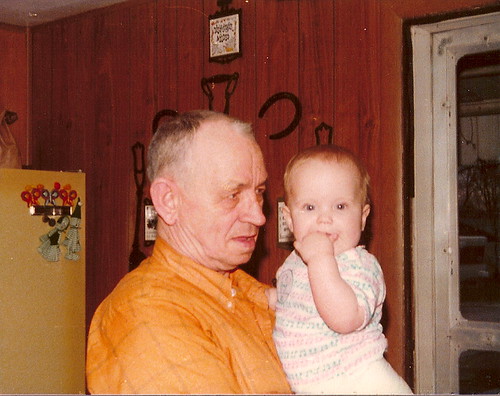Lives of Consumption
 First things first: Happy 90th Birthday Great-Grandpa!
First things first: Happy 90th Birthday Great-Grandpa!While eating breakfast by our front window this morning, on a day where I would spend most of it pissed off at the way humans treat each other, I came upon an article that made me realize we can get it back, you know. We really can.
I can't link to the article, but I'll type it here. It's by Bill McKibben in Conscious Choice, April 2007, page 42, titled "Live Long & Prosper." Maybe it will make you feel better too.
It's a very strong American idea that happiness is something we make for ourselves, to whose "pursuit" we are constitutionally enjoined. In fact, a few years ago an evangelical pollster named George Barna offered a large sample of Americans this question: is the phrase "God helps those who help themselves" found in the Bible? 3/4 of us said yes--even though the phrase actually comes from Ben Franklin. Even though it completely contradicts Jesus' central dictum: love your neighbor as yourself.
How difficult for us, then, is it to stop and realize that the harder we've pursued what we imagined was happiness, the more steadily and successfully it has fled our grasp. We've trebled the American standard of living in the last five decades--and in the same stretch of time the number of Americans who describe themselves as "very happy" has steadily shrunk. It's as if we'd conducted a controlled experiment to find out if money bought happiness and found out-what do you know?-it doesn't. Just like every spiritual leader back to the Buddha has hinted.
But we don't really believe them. We're so primed by our years as consumers with the certainty that more is better that we almost literally can't take in the truth. And can't see the facts that are plain before our eyes: the more prosperous we've gotten, the more lonely we've become. What have we spent our money on in the last five decades? Mostly building bigger houses ever farther apart from each other. We have, on average, many fewer close friends; we eat many fewer meals with family, with neighbors.
We weren't built for lives of isolated consumption. Our collection of limbs and muscles and emotions and senses evolved for other things-that's simply how it is. Mostly, we evolved as social animals-hell, our nearest cousins spend most of their lives sitting around grooming each other, in literal and constant touch.
There are people with too little-ten people crammed into a Chinese hut could use a little more stuff, a little more privacy. They have connection to spare. But we're not those people. The sooner we figure out who we are, the better.



0 Comments:
Post a Comment
<< Home